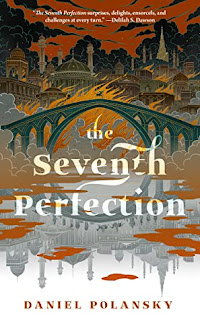4/5 stars on Goodreads
 |
| Dead Man in a Ditch by Luke Arnold |
Dead Man in a Ditch, the second book in Arnold’s Fetch Phillips Archives, takes much longer to get going than the first. Fetch takes on regular detective cases one after another that he solves pretty fast, if not always accurately or the way the client assumes. It isn’t until well past half-point that a plot begins to emerge, which ties in the first half of the book little by little. The story picks up pace towards the end, and with a few twists the book becomes unputdownable.
To his bewilderment, Fetch has gained a reputation in Sunder City as someone who is looking for the lost magic. As the person responsible for its loss, he knows that it can’t be revived and to believe otherwise gives people only false and dangerous hope. Yet he comes across events and items that seem to argue otherwise. There might still be magic in the world. Then he stumbles on a plot involving Sunder City and the well-being of its citizens and he realises that there are things more important to fight for than the past and the lost magic, even if it means going against those he loves.
Fetch is slightly less hopeless and a bit more determined man in this book. He spends less time drunk and more time doing impossible things. But he still suffers from the guilt of what he’s done, and he still yearns to be accepted by those he loves and respects, which causes him to do things he later regrets.
The narrative is more focused in the present than in the first book. I missed the flashbacks into Fetch’s past, but the few there were deepened the plot. The language isn’t quite as descriptive and rich than in the first book, and there are fewer insights into human condition, but it’s still a pleasure to read. The book is a little too long, but that’s all forgotten once the endgame starts. All in all, a good follow-up for an excellent debut.
I received a review copy from NetGalley in exchange for an honest review.





